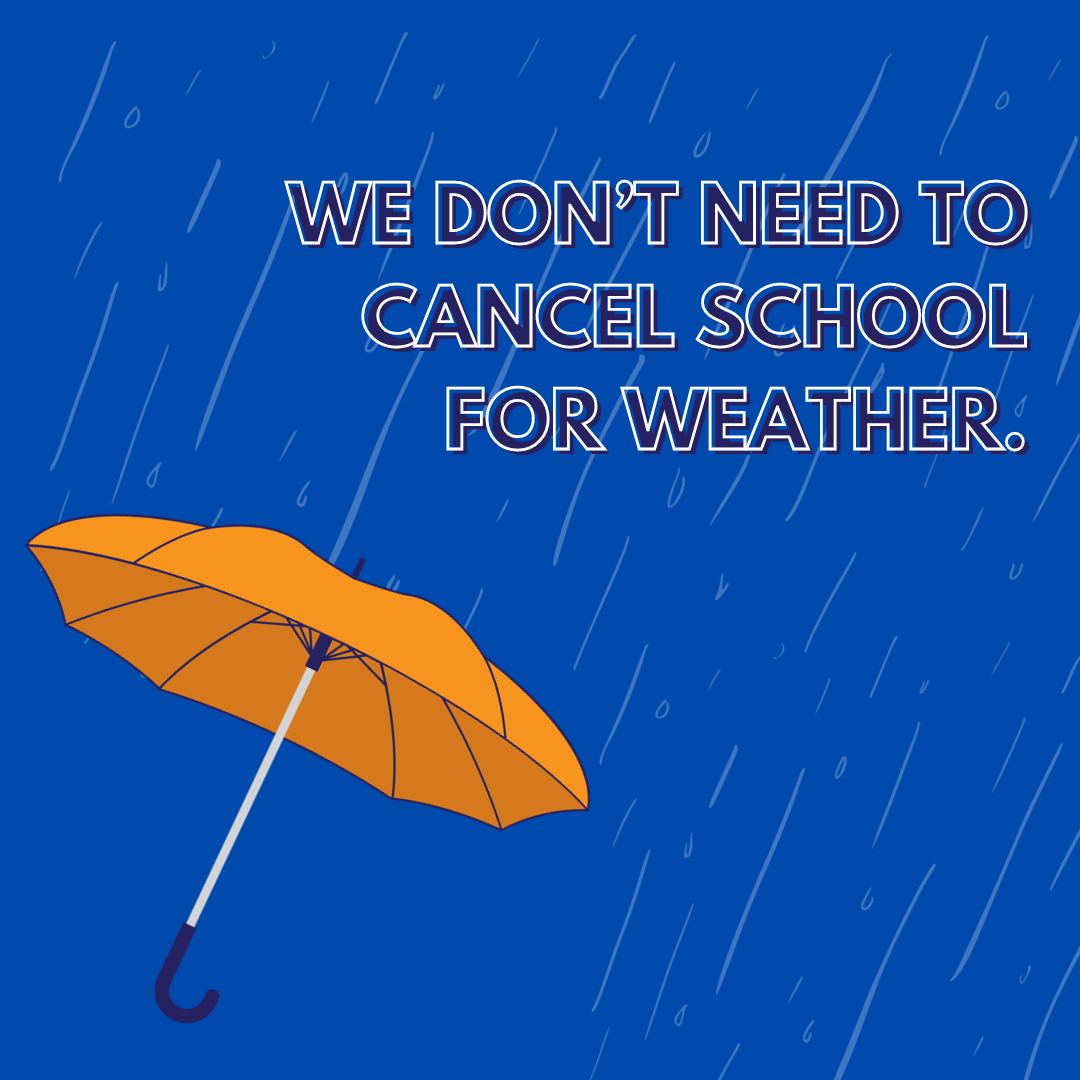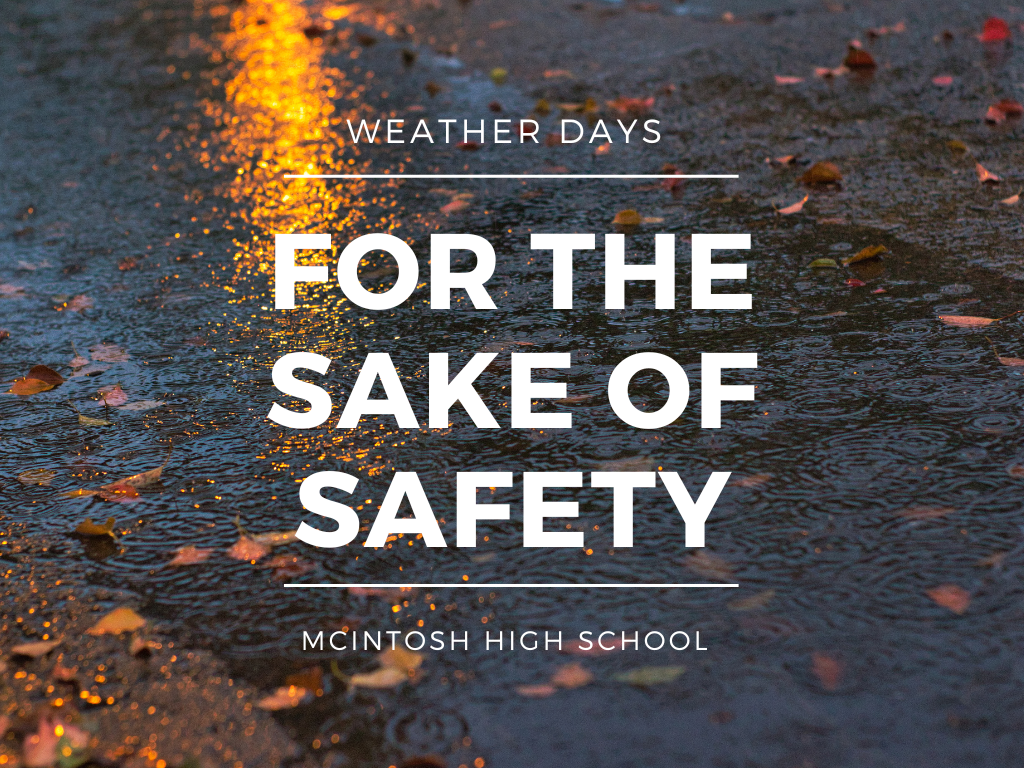OPINION: unpredictable weather and school closures

On Jan. 12, McIntosh High School canceled school and allowed students to stay home, with the reason of unsafe weather conditions.
According to Atlanta News First, the concerns were on “…isolated tornadoes and strong damaging winds between about 1 p.m. and 6 p.m. All of north Georgia is under a level 2 threat (out of 5) for severe weather.”
The school board posted an announcement for canceling school due to “the likelihood for severe weather” despite the “severe weather” only being moderate rainfall. Canceling school from caution alone not only pushes behind academic advancement for students and planning for teachers, but also affects extracurricular engagement and is often an unnecessary action. Light weather advisories are not enough to justify the large disruption to the school schedule, and virtual learning is not a sufficient enough substitute for in-person instruction.
Safe transportation was a main concern with the weather. In a district where golf carts are the main transportation for more than half of the student body, it does seem reasonable that bad weather could pose dangers for many students. Even in cars, students are unreliable drivers in the heavy rain that was experienced. However, on Friday, Jan. 12, school was canceled when the rain wasn’t even set to occur when students were entering or leaving the school.
A light risk to transportation, that can be minimized through careful driving, does not outweigh the safety of students being in the school building for the majority of the day once they arrive. Public transportation exists if parents or students feel their vehicles are not safe enough, and delays are also a preferable and less disruptive alternative to canceling a whole day of instruction.
Although days off school are enjoyable, there are far more downsides than upsides. Students may be happy for a day of sleeping in and watching TV, but when students come back to school a full day of learning has been taken and tests, quizzes and project deadlines become closer and closer. Not only are the students affected, teachers’ lesson plans are now not on schedule.
Canceling school suddenly puts a lot of pressure on teachers to quickly make up assignments and activities for virtual learning. Not being able to come to school gives the students less time to learn the important information they need for quizzes and tests. Many students start to fall behind as teachers had to rush to make new assignments and had to delay quizzes and assessments.
For students taking advanced placement classes, the schedule is carefully set up, and setbacks to learning the material can cost valuable points that could lower AP scores, which translates to college credit. Any impediment to the school day should only be made if absolutely necessary.
Also, losing school days can result in having to make up for lost time from learning and instruction. The Fayette County Public schools website announced their decision to convert two early release days “to full instructional days for students”
Canceling school also impacted any events such as sport games, plays and other extracurricular events that were postponed. The value of extracurriculars cannot be overstated. According to the National Center for Education Statistics, “These activities offer opportunities for students to learn the values of teamwork, individual and group responsibility, physical strength and endurance, competition, diversity, and a sense of culture and community.”
The student-directed Thespian Variety show originally planned for Friday night, had to be canceled and rescheduled. The school and extracurricular activities being canceled greatly inconvenienced the group because they had to reschedule the entire show and rehearsals. This meant communicating with 27 students, 7 parent volunteers, and the troupe leader.
Jan. 12 was made into a virtual learning day for students, in an attempt to minimize the disruption. However, the suggestion that virtual learning could be an alternative to keep students safe and not lead to delays in learning is naively assuming that virtual learning is equivalent to the full value of students being in the classroom.
According to the National Library of Medicine, “Without the face-to-face component, learning and teaching became a completely different experience for students and teachers.” This experience is often lacking compared to regular instruction.
The less time in class the less time students have to ask teachers questions and learn content for assessments. Virtual learning does not help students learn especially students who are hands on and need to physically see what they are learning.

On Jan. 12 the Fayette County school system closed down schools due to the weather and it was the best choice.
McIntosh was included in the many schools that closed down and went virtual to continue students education regardless of the weather conditions; some other districts included Paulding and Meriwether county. The school system handled the weather concern well considering the driving safety concerns, the unpredictability of weather and possibilities of being trapped in the school it seems ideal to cancel school for student and staff safety. Also with the new ability to do online learning, introduced during the coronavirus, students are able to continue their education regardless of not being in person for a day.
TRANSPORTATION SAFETY
Transportation takes many forms, students are brought by buses, parents, and themselves. When driving, dangerous conditions can hinder students’ abilities to safely drive to and from school; considering the fact that many students do not have driving experiences in severe weather conditions, unlike many parents do. Lack of experience in driving in high school students, combined with the use of golf carts in MHS and SMHS, can lead to even bigger issues for those driving in carts not built to withstand these harsh weather conditions, such as high winds and road flooding.
Students also rely on walking, students who are too close for a bus but don’t have parents to drive them or a mode of transportation for themselves, they are reliant on walking. Walking to school when it is downpouring, icy sidewalks, tornado watch, or more, can be dangerous for the students. Not all school districts are small enough that only students immediately surrounding the school don’t get buses, in some districts students over a mile from the school might have to walk.
Bus drivers in more southern areas, where it doesn’t usually freeze, are not used to driving on icy roads. Plenty of students also go on buses, where drivers being unable to safely drive students to school could cause problems. These problems can lead to dangerous situations with unprepared drivers driving large vehicles full of students. Any failure in the driving can lead to a bus full of children being injured.
According to The FHWA Office of Operations, “On average, there are over 5,891,000 vehicle crashes each year. Approximately 21% of these crashes – nearly 1,235,000 – are weather-related.” Therefore, almost a quarter of crashes happen due to threatening weather conditions.
In Georgia, there were 460 snow plows that were deployed due to weather concerns, however this does not mean that these trucks are going to every county, or that there are enough trucks deployed to clear the roads to safe driving conditions for less experienced student drivers or buses.
WEATHER UNPREDICTABILITY
Weather is unpredictable and there are many risks of going to school in extreme weather conditions. Schools should be out when there are weather warnings to avoid chances of students being harmed. Unexpected rain or extremely cold weather could cause roads to be icy or flooded which causes traffic, and possibility for cars to crash. Making students go to school in harsh weather is not putting the students safety as a top priority. Instructional time could be interrupted if a severe weather drill is taking place, which would mess up the schedule. It would be better to take the day off and have a virtual day..
According to georgia.gov, “Georgia regularly faces many types of natural disasters including hurricanes, tornadoes, severe storms, wildfires and floods.” These natural disasters are hazardous to the staff, students and parents. Making students attend school would be putting their safety at risk.
SNOWED IN/TRAPPED IN SCHOOL
Students’ mental health while in school during unpredictable weather tends to be a topic overlooked, even though it can be a stressful situation for both staff and students. The thought of being trapped, weathered in or put in danger can greatly affect a student’s ability to learn. If a student has a constant worry for their safety, how are they supposed to concentrate?
For McIntosh High School last year, after the last bell rang some students were told to stay inside their classes as the power went out and the sky turned orange and dark due to a tornado. Scared and unknowing of what was going on, students contacted their loved ones and tried to communicate with others on how they could get out of the situation. About an hour later, they were released into rainy weather rushing to get home for safety. However, during the unpredictable event, students were not allowed to leave the premises unless you were one of the few people who were able to get out before the announcement was issued. During the tornado, who would have been held accountable if a student or staff member fell victim to the unsafe weather? What if this event had gone completely differently, such as harming teachers, students or staff?
This could have been avoided if it was decided to instead do a virtual school day. Often when school is canceled last minute, teachers will assign online tasks for their students to complete. This virtual learning has offered students to work at their own pace, provide flexibility, allow for better time management and overall permit them to continue their education despite a pause in the school day.
Virtual days count as instructional days and are included in the 180 days required in Georgia for each school year. Schools are permitted a certain amount of “weather days” to take which do not count against those 180 days and do not need to be made up.
CONCLUSION
Safety should be an upper priority of any institution. The possibility of crashes, dangers, or being trapped in school are all risks that have less payout than having students stay home and take their classes online. Along with the unpredictability of Georgia weather and weather in general, it seems obvious that the school board should instate digital learning days in place of a brick-and-mortar setting in order to ensure not only the student’s safety but the sanity of staff and parents.
Your donation supports the student journalists of McIntosh High School. Your contribution allows us to cover our annual website hosting costs, to help pay printing costs for "Back to Mac" magazine, and continuing education for staff, such as SNO trainings and MediaNow! editorial leadership training.
